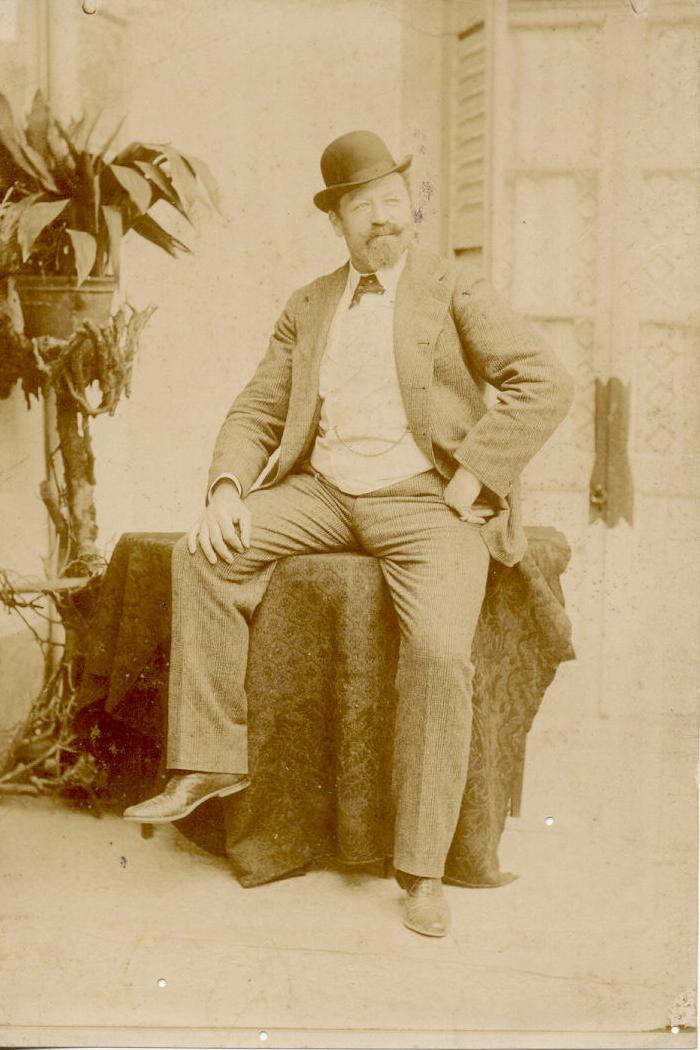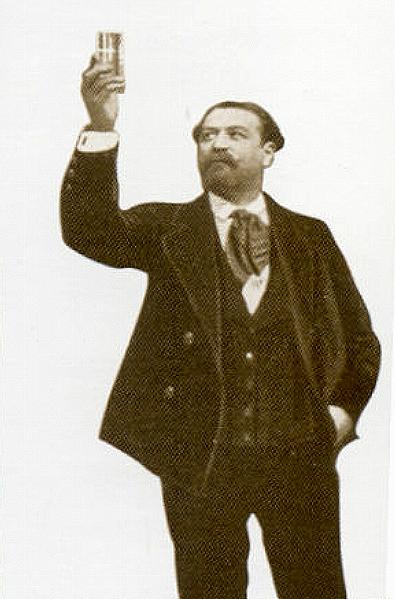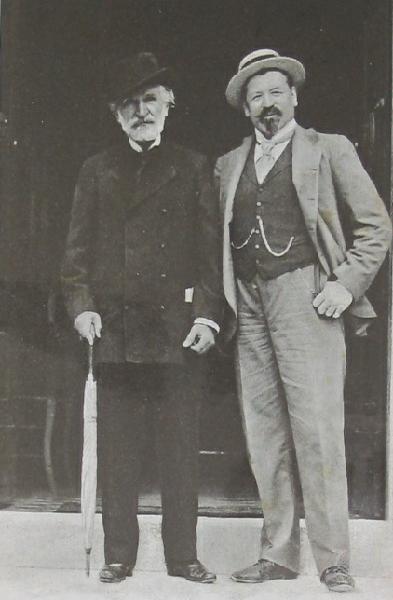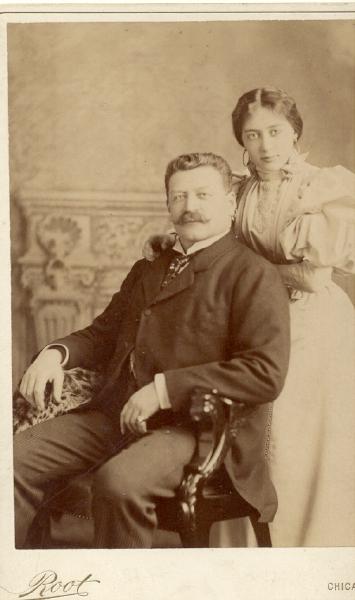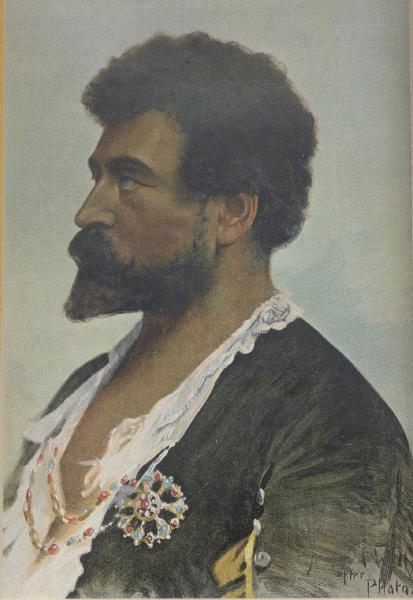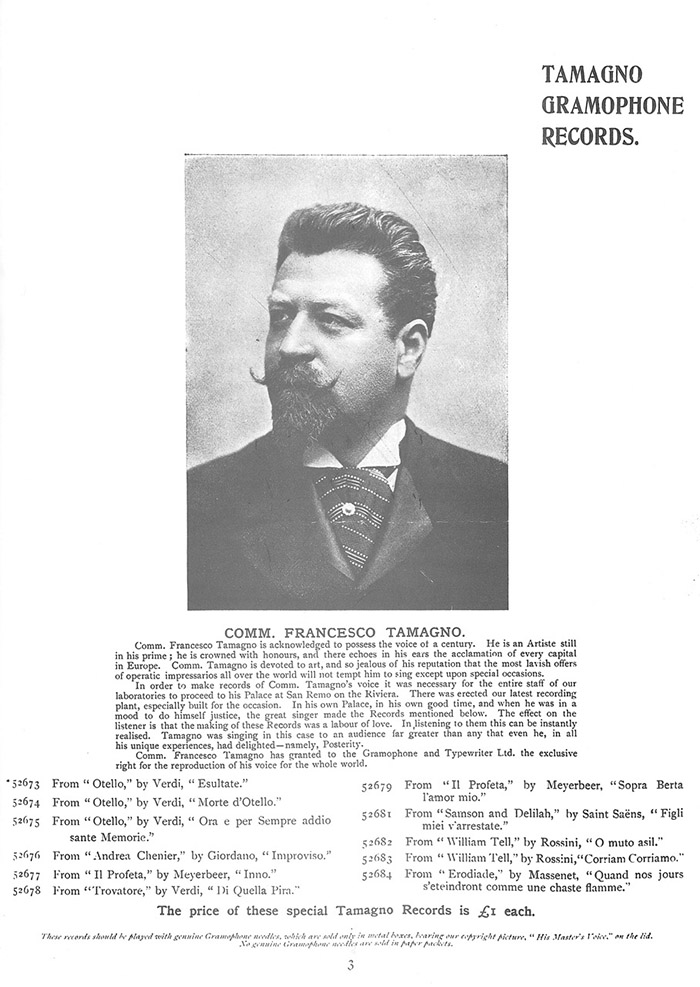His father was an innkeeper; of his 14 siblings, ten died in the 1854 cholera epidemic. Early on, he began to sing in an
amateur group, and in a church choir. From 1870, he attended a music school, and the same year, he became a chorister at
the Teatro Regio. After short compulsory military service, he made his debut as a soloist on 27 February 1872, as a
comprimario in La colpa del cuore by Francesco Cortesi.
In June 1873, he made a four-year contract with a booker who made him build a repertory of main parts – of many, many
main parts in short time, a very strenuous contract. But utterly successful: Tamagno sang in Palermo (Teatro Bellini),
Ferrara, Rovigo, a lot at La Fenice in Venice, and from 1875 to 1877, two full seasons at the Liceu in Barcelona (eleven
operas in the first, ten in the second season).
On 26 December 1877, he made his Scala debut as Vasco da Gama, followed in February 1878 by Fosca by Gomes: complete
success. In May 1878, he went on his first tour to Latin America, where he was to become a particular favorite: he sang
regularly at the Colón in Buenos Aires (1878–98), further in Rio de Janeiro (1878–81), Montevideo
(1884 and 1896) and Ciudad de México (1890 and 1894).
In 1879, his beloved daughter Margherita was born; the mother was a married noblewoman, Tamagna never revealed her name,
and he took care of the child all alone, a loving single father, certainly a rara avis in his time. He always carried the
girl with him, in spite of the splendid international career that he now made.
In 1879, he sang first in Lisbon, then a long season at the Pagliano in Florence, which included the world premiere of
Ponchielli's Figliuol prodigo, and the premiere of the second version of Simon Boccanegra. In Rio de Janeiro,
he sang his first Arnold that year. His top notes were legendary, and Arnold became one of his most famous parts.
In 1883, he scored triumphs as Poliuto (in Bologna and Rome) and Manrico (Rome). On 10 January 1884 at La Scala, he sang
the title role in the premiere of the four-act-version of Don Carlo, although this never became his favorite role.
After his return from another summer spent in Latin America, he sang another highly successful Poliuto in Torino.
In early 1885, he was at La Scala for Le prophète, Mefistofele and the world premiere of Ponchielli's
Marion Delorme.
Verdi's editor Giulio Ricordi greatly favored Tamagno for the world premiere of Otello; Verdi hesitated, he thought
Tamagno to be too unsophisticatedly dramatic for the part (plus Tamagno had a reputation as a lousy actor). But eventually,
Verdi gave in, Tamagno created Otello on 5 February 1887 at La Scala, and it became a roaring success both for Verdi and
him. Tamagno had now found the part with which he would be associated for all eternity.
He repeated Otello the same year in Rome and Venice, in 1888 in Naples and Buenos Aires, in 1889 in Palermo, Torino,
Genova and London (Lyceum), in 1890 in Chicago, Ciudad de México, San Francisco, Denver, Boston, at the Met and in
Philadelphia, in 1891 in Nice, Lisbon and Moscow (Panaev Theater), in 1892 in Madrid and Barcelona, in 1893 in Valencia and
Sevilla, in 1894 in Monte Carlo, Baltimore, Washington, St. Louis and at the Bolshoj, in 1895 at Covent Garden, in 1896 in
Montevideo, in 1897 in St. Petersburg, Munich and at the Paris Opéra.
In 1897, he toured also Germany with Le prophète and Il trovatore (Köln, Frankfurt, Dresden). In
1899, he was back at La Scala as Arnold, and in Naples as Poliuto, plus he was Hélion in the world premiere of de
Lara's Messaline in Monte Carlo – the part had been explicitly written for him.
By then, Tamagno had developed a heart condition, and for the rest of his career, he sang primarily in concert and only
infrequently on stage. His last operatic performance was Poliuto at the Teatro Dal Verme in Milano on 9 June 1904;
his last concert took place in Torino on 27 March 1905.
Reference 1: Treccani, Dizionario Biografico degli Italiani, vol 94, Roma 2019; reference 2
